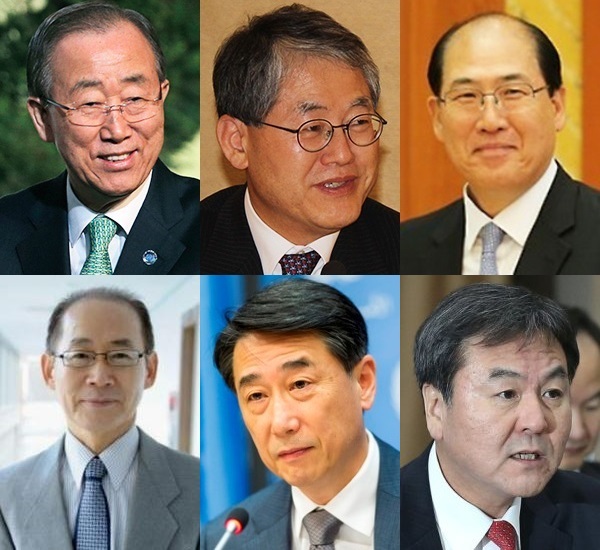- California Assembly OKs highest minimum wage in nation
- S. Korea unveils first graphic cigarette warnings
- US joins with South Korea, Japan in bid to deter North Korea
- LPGA golfer Chun In-gee finally back in action
- S. Korea won’t be top seed in final World Cup qualification round
- US men’s soccer misses 2nd straight Olympics
- US back on track in qualifying with 4-0 win over Guatemala
- High-intensity workout injuries spawn cottage industry
- CDC expands range of Zika mosquitoes into parts of Northeast
- Who knew? ‘The Walking Dead’ is helping families connect
Korea bolsters UN presence

Clockwise from top left — U.N. Secretary General Ban Ki-moon, Human Rights Council President Choi Kyong-lim, International Maritime Organization Secretary Lim Ki-tack, Financial Action Task Force on Money Laundering (FATF) President Shin Je-yoon, Economic and Social Council (ECOSOC) President Oh Joon, and Intergovernmental Panel on Climate Change (IPCC) Chairman Lee Hoe-sung.
By Yi Whan-woo
Seoul is bolstering its presence at the United Nations with Koreans being named to head agencies there.
With Ban Ki-moon, Korea’s former foreign minister, working as the U.N. chief since January 2007, five more Koreans have been named to lead U.N. bodies.
Three of them are Intergovernmental Panel on Climate Change (IPCC) Chairman Lee Hoe-sung, Economic and Social Council (ECOSOC) President Oh Joon and Financial Action Task Force on Money Laundering (FATF) President Shin Je-yoon.
Two others _ Choi Kyong-lim and Lim Ki-tack _ are set to begin their respective terms at the U.N. Human Rights Council (UNHRC) and International Maritime Organization (IMO) starting January 2016.
The UNHRC elected Choi, a permanent representative of Seoul’s mission to the U.N. in Geneva, at its board of directors meeting, Tuesday, for a one-year term.
Lim Ki-tack, president of the Busan Port Authority, was elected as the IMO’s next secretary from 2016 to 2020 during the IMO’s 40-member council session in July.
Lee, a former professor of energy and environment at Korea University, is serving a seven-year chairmanship at the IPCC that started in October.
The IPCC is aiming to give a scientific analysis of climate change and its potential environmental and socio-economic impacts. It was established in 1988 by U.N. Environment Program and the World Meteorological Organization.
Oh, Korea’s ambassador to the U.N., has been leading ECOSOC since July.
ECOSOC is one of the six major U.N. organs, including the General Assembly, the Security Council, the Trusteeship Council, the Secretariat and International Court of Justice.
Oh took a one-year job as the U.N. seeks to draft a post-2015 development agenda to last through 2030.
Shin, a former chairman of the Financial Services Commission (FSC), has been serving his one-year presidency at the FATF since July. The FATF has collaborated closely with the U.N. since 2001 to fight terrorist financing and prevent money-laundering.
The FATF picked Shin for its top job in February when he was the FSC chairman.
The UNHRC has played a key role in stepping up pressure against North Korea for its crimes against humanity. In June, it opened a permanent office in Seoul to exclusively investigate Pyongyang’s human rights abuses in line with the U.N. Commission of Inquiry’s report released in February 2014.
IMO is the U.N.’s specialized agency responsible for improving maritime safety and preventing pollution from ships.
In addition to the five officials, Foreign Minister Yun Byung-se will chair next year’s International Conference on Nuclear Security (ICNS). The ministerial-level conference will take place from Dec. 5 to 9 at the headquarters of the International Atomic Energy Agency (IAEA) in Vienna. The IAEA reports to both the U.N. General Assembly and Security Council.
“2016 will be crucial for South Korean diplomacy as the country will be dealing with three major issues of the U.N. ― security, climate change and sustainable development,” an official said.












![일본 사도광산 [서경덕 교수 제공. 재판매 및 DB 금지]](http://www.koreatimesus.com/wp-content/uploads/2024/07/PYH2024072610800050400_P4-copy-120x134.jpg)


